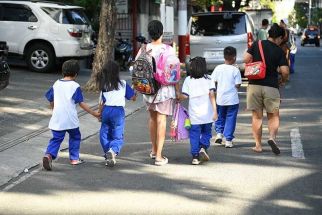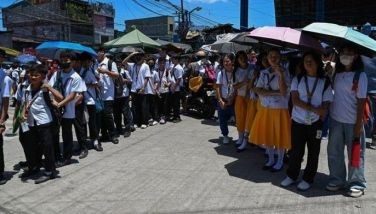Japanese firms pledge electronics investments in Philippines
TOKYO – The Philippines has secured billions of pesos worth of investment pledges from Japanese companies engaged in semiconductors, electronics and wiring harness, which Malacañang said would generate more than 10,000 jobs for Filipinos.
President Marcos met here yesterday with Japan’s semiconductor and electronics industries looking to expand their operations in the Philippines.
Among those present at the roundtable meeting were top executives of Japan Aviation Electronics Industry Ltd., Yazaki Corp., Yokowo Manufacturing of the Philippines, Sumitomo Electric Industries Ltd., Brother Industries Ltd., IBIDEN Co. Ltd., Seiko Epson Corp., NIDEC-SHIMPO Corp. and TDK Corp.
Marcos is expected to announce today the total amount of investment commitment during the signing of the letters of intent by the Japanese companies, according to the Presidential Communications Office.
In his speech, Marcos said the country aspires to become “hubs of excellence for sectors where we have a natural comparative advantage.”
“We want the country to attain the status as a regional hub for printers, wiring harnesses, and other electronic goods,” he told the business leaders.
With the automotive industry moving toward electric vehicles and autonomous driving and the printer industry facing challenges related to digitalization and automation, Marcos said he hopes Japanese companies would recruit more talented Filipino workers for research and development activities.
In 2021, the Philippines was the fourth largest exporter of wiring harness in the world after Mexico, China and Romania.
The Philippines is also one of the lowest cost producers of wiring harness in the world, based on exported value and quantity.
This trend has been building over a 20-year period during which wiring harness exports have grown at a steady pace of nine percent annually between 2001 and 2021.
The automotive wiring harness market is expected to exceed $93 billion this year, with global demand for greater fuel efficiency and electric vehicles fueling growth in the coming years.
Meanwhile, Marcos also made a commitment to Japanese investors Thursday to pursue intensified efforts to upskill and reskill Filipino workers so they can remain competitive under the new global economy and technological advances.
“We also consider very important the programs that you have elucidated here today about the upskilling and reskilling of our workforce,” Marcos said.
“It’s very clear that we are shifting in the world economy, away from the more traditional, industrial activities to a high technology world,” he said.
The President said his administration puts a premium on the operation of Japanese companies in the Philippines, being the country’s prime job generator, support provider for sectors critical to industrial development, and value creator through innovation in manufacturing around the world.
Tax refund, logistics issues
Marcos also vowed to address the issues raised by business executives such as value-added tax refund issues, logistics and manpower requirements.
“And it is why we have taken note of the comments that you have made, specifically in the areas of the VAT exemption, in the problems of logistics and supply chains, and to that end, the infrastructure development in the Philippines has actually been accelerated,” he said.
“We have listened to your concerns and your issues, and we intend to respond to these challenges with a whole-of-government approach. The hope is that our strength in these sectors will beget more strength in the entire Philippine industrial landscape to the benefit of the Philippines and also of our partners and our investors,” the President said.
On Wednesday at a dinner meeting with executives of Mitsui & Co. and Metro Pacific Investments Corp. (MPIC), Marcos said partnerships in trade and investments – which have long been dormant since the outbreak of the pandemic – should be revitalized.
“The partnerships, I think, that we have developed with our friends here in Japan — with Mistui, in particular — we will have to revitalize them as they have been dormant to an effect, to a degree, during the lockdowns of the pandemic,” Marcos said in a speech.
With the President at the dinner meeting were First Lady Liza Araneta-Marcos, Pampanga Rep. Gloria Macapagal Arroyo, Senate President Juan Miguel Zubiri, Speaker Martin Romualdez, Mitsui & Co. chief executive officer Kenichi Hori, MPIC chairman Manuel Pangilinan and Cabinet members.
“We look forward to the discussions that we will be having here for the next few days as we have very much— we have great hopes that this will be a driver in our… the transformation of our economy,” he said.
The Philippines’ gross domestic product or GDP grew by 7.6 percent in 2022, the highest in 46 years.
Mitsui & Co. is a Japanese company that primarily engages in product sales, logistics and financing, infrastructure projects, iron and steel products, information technology and communication, among other businesses. It currently operates in 128 offices in 63 countries, including the Philippines.
MPIC is a Philippine-based investment management and infrastructure holding company mostly involved in strategic partnerships through improving operational efficiency, increasing customer coverage, and working closely with regulators and other partners in government.
The President arrived here Wednesday for a five-day official visit, which seeks to strengthen Manila and Tokyo’s collaboration in a wide range of areas, including agriculture, renewable energy, digital transformation, defense and infrastructure.
This is Marcos’ ninth foreign trip since assuming the presidency in June last year.
Projects restarting
In an interview with reporters on board PR001 on Wednesday, Marcos said the Philippines and Japan are finalizing some of the projects that were halted because of the COVID-19 pandemic as well as new viable projects, including agribusiness investments.
“Well, number one, that opens up not just the usual exchange of technology, but that’s an important part of it, but also investment in agriculture and hopefully opening markets in Japan for our agricultural products,” the President said, referring to key deals expected to be signed between the two countries, which include an agreement in agricultural cooperation.
“We can point to so many of the developments that happened in the Philippines with the assistance of the different Japanese funding agencies and our government-to-government arrangements and commercial arrangements, and these have been to the benefit of both our countries,” he said.
Japan is the only country with which the Philippines has a bilateral free trade agreement called the Japan-Philippines Economic Partnership Agreement or JPEPA.
In 2021, Japan was the Philippines’ second largest trading partner as well as the third largest export market and second top source of imports.
Japan has also been the country’s biggest bilateral source of active official development assistance or ODA, providing concessional loans to finance important infra and capacity building projects, social safety net programs, education, agriculture and science and technology support, and many other high impact programs.
The Department of Migrant Workers, meanwhile, said it has opened a special desk to ensure fast processing of applications for jobs in Japan where employers have expressed their desire to hire Filipino workers.
“The general sentiment among Japanese employers was that Filipino workers brightened up their workplaces and were highly reliable and trainable,” Migrant Workers Secretary Susan Ople said.
Ople met with Japanese employers and Filipino workers in Japan yesterday.
According to Ople, Filipino workers assured her that they are being treated well and that they prefer to continue working in Japan.
“We want to build stronger relations with Japanese employers and the Japanese government so that the Philippines can be the number one source of skilled workers in Japan,” Ople said.
Salaries in Japan range from P54,548 for entry-level for trainee workers to P377,640 for specialized positions and highly skilled professionals.
But those who intend to work in Japan need to pass a language proficiency test.
“We will look into these bottlenecks and obstacles and try to untangle them one by one. Japan has proven to be a reliable partner in overseas employment,” Ople noted.
- Latest
- Trending
































